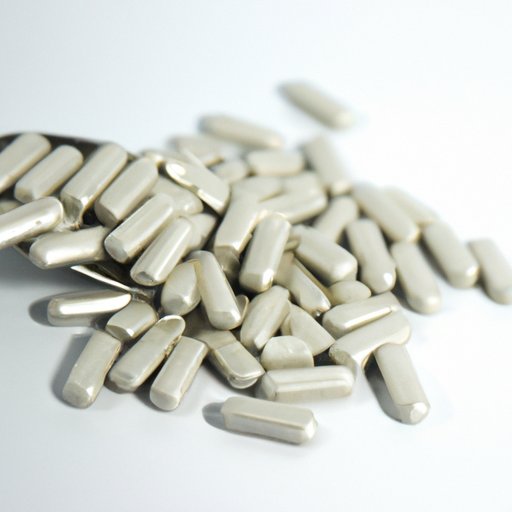Introduction
Acne is a common skin condition that affects millions of people around the world. It can cause red bumps, whiteheads, blackheads, cysts, and scars. Treatment options vary, but many people are turning to natural remedies like zinc to help manage their breakouts. But is zinc really effective for treating acne? In this article, we’ll explore the research on zinc and acne and discuss how you can incorporate it into your skin care routine.
Exploring the Research: Is Zinc an Effective Treatment for Acne?
Zinc is an essential mineral found in foods like beef, pork, beans, nuts, and dairy products. It plays a role in many different bodily processes, including wound healing, cell growth, and immune system function. Studies have suggested that zinc may also be beneficial for treating acne.

What Studies Show About Zinc and Acne
A few studies have looked at the effect of zinc on acne. One study found that taking a supplement containing zinc, vitamin A, and other minerals reduced acne symptoms more effectively than a placebo in a group of teenagers. Another study found that a topical gel containing zinc was effective at reducing inflammation and the number of acne lesions.
Other studies have looked at the effect of zinc on sebum production, which is thought to play a role in acne development. One study found that taking a daily dose of zinc significantly reduced sebum production in a group of men. Another study found that applying a topical cream containing zinc helped reduce sebum production in a group of women.
While these studies suggest that zinc may be beneficial for treating acne, more research is needed to confirm its effectiveness.
How to Incorporate Zinc into Your Acne-Fighting Routine
If you’re considering using zinc to help manage your acne, there are two main ways to incorporate it into your skin care routine: taking zinc supplements or using topical zinc products.
Taking Zinc Supplements for Acne
Zinc supplements are available in pill form and can be taken orally. They come in different dosages, so it’s important to talk to your doctor before starting any new supplement. Your doctor can help you determine the right dosage for you based on your age, weight, and medical history.
Pros: Taking a zinc supplement is an easy way to get more of this important mineral in your diet. It may also help reduce inflammation and sebum production, which can help prevent future breakouts.
Cons: Zinc supplements can cause nausea, vomiting, and stomach upset in some people. They can also interact with certain medications, so it’s important to talk to your doctor before taking any supplements.
Dosage Guidelines: The recommended daily allowance (RDA) for zinc is 8 mg for women and 11 mg for men. If you’re taking a zinc supplement, it’s best to start with the lower end of the dosage range and increase gradually as needed.
Topical Zinc for Treating Acne
Topical zinc products are applied directly to the skin and come in various forms, such as creams, gels, and lotions. Some products contain other ingredients, such as salicylic acid, which may help reduce inflammation. As with any skin care product, it’s important to read the label and follow the instructions carefully.
Types of Products: Topical zinc products are available over the counter and by prescription. Over-the-counter products typically contain lower concentrations of zinc, while prescription products often contain higher concentrations.
How to Use: Before applying a topical zinc product, wash your face with a gentle cleanser and pat dry. Then apply a thin layer of the product to the affected area and allow it to dry. For best results, use the product twice a day, once in the morning and once at night.
What You Need to Know About Zinc and Acne Breakouts
It’s important to keep in mind that zinc may not work for everyone. Some people may experience side effects, such as nausea, vomiting, and stomach upset. Zinc can also interact with certain medications, so it’s important to talk to your doctor before taking any supplements.
In addition, it’s important to note that zinc is not a substitute for other acne treatments. While it may help reduce inflammation and sebum production, it won’t necessarily cure your acne. For best results, it’s best to use zinc in combination with other treatments, such as topical retinoids, antibiotics, and benzoyl peroxide.
Conclusion
Zinc is an essential mineral with many potential health benefits. Studies have suggested that it may be beneficial for treating acne, but more research is needed to confirm its effectiveness. If you’re considering using zinc to help manage your breakouts, talk to your doctor about the best way to incorporate it into your skin care routine. With the right approach, zinc may be able to help reduce inflammation and sebum production, leading to fewer breakouts.


